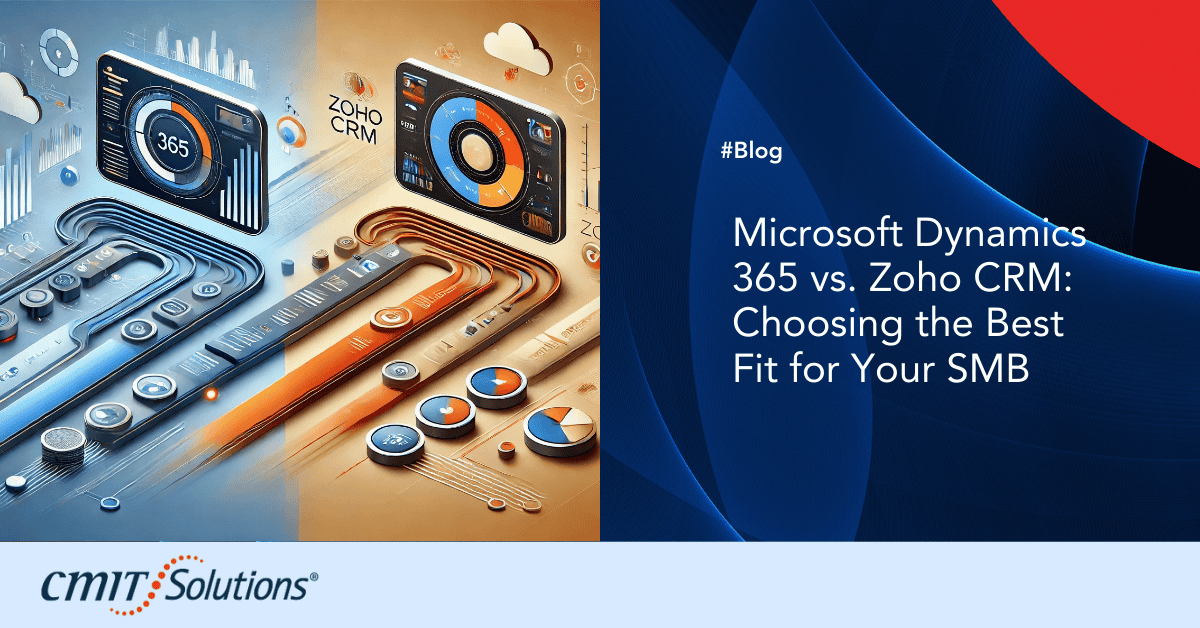Customer Relationship Management (CRM) is more than just a tool—it’s the heartbeat of modern business success. By enabling businesses to streamline sales processes, optimize marketing efforts, and enhance customer experiences, CRM solutions empower small and medium-sized businesses (SMBs) to thrive in competitive markets. With so many options available, how do you choose the right platform?
In this comparison, we’ll dive into the features, integrations, and pricing of two leading CRM platforms: Microsoft Dynamics 365 and Zoho CRM. Armed with this insight, you’ll be better equipped to select the CRM solution that aligns with your business goals and enhances your operations.
Learn how future-proof IT solutions can optimize your business processes.
Why CRM Matters for SMBs
For SMBs, effective customer relationship management is the cornerstone of growth. A robust CRM system helps you:
- Track sales leads and pipelines.
- Automate repetitive administrative tasks.
- Improve collaboration across teams.
- Deliver personalized customer experiences.
Cloud-based CRM platforms like Microsoft Dynamics 365 and Zoho CRM have made these benefits more accessible, offering mobility, scalability, and integration with existing tools.
Explore how IT applications can supercharge productivity.
What Sets Microsoft Dynamics 365 Apart?
Microsoft Dynamics 365 is an all-in-one CRM solution designed to streamline business processes and improve customer engagement. As a cloud-based platform, it provides real-time insights and updates, ensuring you always have access to the latest tools.
Key Features of Microsoft Dynamics 365 CRM
- Customer Data Management
Dynamics 365 offers a unified view of customer data, enabling businesses to personalize interactions and make informed decisions. From communication history to customer preferences, the platform centralizes all essential data. - Sales Automation
The platform automates critical sales tasks, such as lead tracking and opportunity management, allowing sales teams to focus on closing deals. Its AI-powered insights improve forecasting and decision-making. - Marketing Automation
With tools for campaign management, email marketing, and engagement tracking, Dynamics 365 helps businesses run targeted marketing campaigns that yield measurable results. - Field Service Management
For businesses requiring on-site services, Dynamics 365 simplifies scheduling and dispatching, ensuring efficient service delivery. - Customizability and Integrations
As a Microsoft product, Dynamics 365 integrates seamlessly with tools like Outlook, Excel, and SharePoint, providing a cohesive experience for users already within the Microsoft ecosystem.
Discover how seamless integrations can enhance productivity.
What Makes Zoho CRM a Contender?
Zoho CRM is a popular choice among SMBs due to its affordability and wide range of features. It’s a cloud-based solution that excels in marketing automation, analytics, and omnichannel engagement.
Key Features of Zoho CRM
- Salesforce Automation
Zoho automates sales processes such as lead nurturing, opportunity tracking, and sales forecasting. Its intuitive interface makes it easy to manage these tasks efficiently. - Marketing Automation
With customer segmentation and integration with tools like Google Ads, Zoho provides SMBs with the tools to execute and track marketing campaigns. - Omnichannel Engagement
Zoho CRM supports real-time communication across multiple channels, including email, live chat, and social media, enabling businesses to connect with customers wherever they are. - Analytics and Reporting
Customizable dashboards and reports allow users to track performance metrics and gain insights into their sales and marketing efforts.
Learn how IT solutions enhance business operations.
Comparing Pricing: Microsoft Dynamics 365 vs. Zoho CRM
Microsoft Dynamics 365 CRM
- Sales Professional: $65 per user/month
- Sales Enterprise: $105 per user/month
- Sales Premium: $150 per user/month
Zoho CRM
- Free for up to three users.
- Paid plans range from $12 to $100 per user/month, depending on features.
While Zoho offers a more affordable entry point, Microsoft Dynamics 365 provides more advanced features and scalability, making it a better choice for businesses looking to grow and expand.
Contact us to explore pricing options tailored to your business needs.
Customizability and Integration: A Key Differentiator
Zoho CRM
Zoho offers basic customization options, mainly cosmetic in nature. While it integrates with popular tools like Google Drive, MailChimp, and QuickBooks, its capabilities may be limited for businesses with complex workflows.
Microsoft Dynamics 365
Dynamics 365 shines with its extensive customization capabilities and seamless integration with the Microsoft ecosystem. With biannual updates and a large marketplace of third-party tools, businesses can adapt the platform to meet specific needs.
See how advanced IT solutions can future-proof your business.
Which CRM Should You Choose?
Choose Microsoft Dynamics 365 If:
- You need advanced customization and deep integrations.
- Your team relies heavily on Microsoft tools.
- You’re looking for a CRM that scales with your business.
Choose Zoho CRM If:
- You’re a startup or small business with a limited budget.
- You need essential CRM features without advanced customizations.
- You prefer a simple, user-friendly interface.
Let us help you choose the right CRM for your business.
Final Thoughts: Dynamics 365 Takes the Lead
While both Microsoft Dynamics 365 and Zoho CRM are excellent platforms, the choice ultimately depends on your business goals and budget. Dynamics 365 excels in customizability, integrations, and advanced analytics, making it the ideal choice for SMBs ready to invest in a scalable, future-ready solution. Zoho CRM, on the other hand, offers a solid entry point for businesses just starting out.
Regardless of the platform you choose, the right CRM will help you streamline operations, enhance customer relationships, and drive business growth.
Conclusion: Choosing the Right CRM for Your Business Growth
The right CRM is more than just a software—it’s the backbone of your customer relationships, sales strategy, and overall business efficiency. Both Microsoft Dynamics 365 and Zoho CRM offer valuable features, but their strengths cater to different business needs.
Microsoft Dynamics 365 stands out with its robust customizability, deep integration with the Microsoft ecosystem, and advanced analytics capabilities. It’s the go-to choice for SMBs looking for a scalable, comprehensive solution to support long-term growth and complex workflows.
Zoho CRM, on the other hand, shines as an affordable, user-friendly option for startups or smaller businesses seeking essential CRM functionalities. Its focus on omnichannel engagement and marketing automation makes it a practical choice for companies just starting their CRM journey.
Ultimately, the decision comes down to your unique business needs, goals, and budget. Investing in the right CRM will empower your team, improve customer experiences, and drive sustainable growth.




